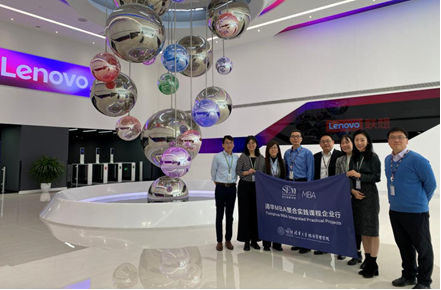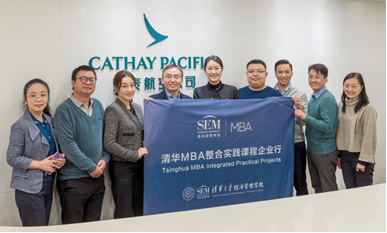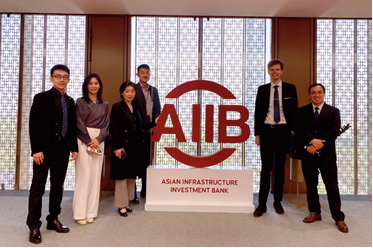The global economy remains uncertain. Companies are scrambling to reinvent their business models amid an unprecedented technological transformation. Innovations are constant and occur at a mind-boggling speed. Amid these rapid changes, it is more important than ever to arm business students with real-world experience.
Experiential Learning
The Tsinghua Global MBA Program is leading the charge by helping students shoot for the stars through its Integrated Practical Projects (IPP), a critical component of the program where experiential learning diverges from the traditional lecture-based classes to offer students a chance to bridge the gap between theory and practice.
"Experiential learning is an innovative and engaged learning process; it really emphasizes learning by doing," explained Professor Jia Ning, director of the GMBA. "It can take place inside and outside the classroom."

IPP was launched after Tsinghua MBA Programs collaborated with leading enterprises to provide hands-on learning through projects that address real-world business challenges. It has diversified tracks that include Business Plan and Design, Management Consulting, Strategy, Management Innovation of the Information Era, Organizational Behavior and Human Resources, Financing, and Marketing.
"The IPP is really a consulting project," said Steven White, an IPP mentor and associate professor at the Tsinghua University School of Economics and Management. "Usually, the students spend a lot of time on site, at the company, to get a feel for what’s going on, depending on what the chosen project is."
The school’s close relationship with students’ study and personal lives allows it to develop IPP tailored to their needs and combined with cutting-edge business dynamics and trends in the China market.
"We’ve had mostly projects with companies based in China, but also a lot that are foreign and are outside of China, usually those with subsidiaries," remarked Professor White. "[These include] Lenovo, JP Morgan – very large multinational companies – and smaller startup firms."
More than 50 IPPs are offered, and around 20 are successfully implemented after mutual selection, close monitoring, and prompt resolution of issues by the Tsinghua MBA to ensure a smooth experience for students placed in teams of up to four members, assigned an academic professor and an industry mentor, and required to work alongside a team of management executives.
Real-world business study
“We're in Beijing, where we have access to a variety of different companies,” said Professor Jia. “These are based on the Chinese new fast economic growth, are in different industries, and are at various stages of their development. “This allows the students to have the pleasure of getting to know a variety of different companies and then develop practical insights and knowledge.”
This has been the case for Malaysian-born Jeffrey (Yukernliang), a current student in the GMBA program, who along with his three fellow team members had the chance to develop their talents by engaging in the IPP sponsored by the Asian Infrastructure Investment Bank (AIIB), his dream company and a major player in global financing of infrastructure investments.
“The project gave us an opportunity as MBA students to research climate transition, quite a new topic,” said Jeffery. “One of the tasks that impressed me the most was the research. We gained a lot of insights from this project and had a glimpse at the kinds of trends investors had been looking at. It was not just about greenwashing.”
He says the experience was made possible by his admission to the best university in China, a chance that has provided him with a fresh perspective on China.
"IPP helped me develop a perspective that China is keeping up with or leading the trend with work done by other countries like in AI [Artificial Intelligence], semiconductors, and clean energy," shared Jeffery, adding that China’s intensive exploration of various opportunities and research made him acknowledge it as a leader as well as "understand the direction and focus of China."
Xiaoqing Geng, another student from the master’s program who participated in the IPP with Tsinghua Holdings Capital, shares the same sentiment." I used to think local companies were followers of global trends," confessed Geng. "But during the IPP, I found that we are catching up with the leading trends, and there are more innovations happening here than before."
Professor White attributes this discovery to IPP’s unique, robust, and rewarding curriculum. "The content of it is different from the other types of China-related experiences that the students will have," remarked Professor White. "And it's also different from the same kind of projects that they would get in business schools in the U.S., Canada, Europe, or Australia."

Irene Kim, an alumna of the MBA Class of 2019, now working as a strategy associate at AIIB, agreed that the practicum improved the quality of her experience and knowledge during her time at Tsinghua.
"The IPP was a good complement to what I was learning from the other courses at school," said Kim. "A lot of the case studies that we had at the MBA program were more focused on well-known companies, whereas the ones that I looked at through IPP were early-stage startups that nobody else knew about."For her, this difference in the study offered her a platform to have the best of both worlds in terms of the growth and operations of investment companies.
"As part of my role at AIIB, I help our investment officers look at Chinese private equity and venture capital funds," stated Kim. "A lot of these would have an interest in investing in small startups, and the skillsets such as research that I gained from IPP help me to get a better understanding of what the fund is trying to do."
A sustained and enduring network
These skills have also been honed with the help of instructions from industry mentors, who impart invaluable firsthand knowledge and keep students up-to-date with the latest skills required in the industry.
"Our team had regular meetings with two industry mentors every one to two weeks, separately," recalled Geng. "They provided us with professional guidance, priceless knowledge, and equipped us with the latest skillset required in the industry—which made our report solid and practical," Geng says the relationship between students and mentors that is built during the IPP does not end after the completion of the project.
"Even now, when I encounter problems with the industry or trouble with my own career planning, I still reach out to Song Bo for advice,” she said. "She is my IPP mentor, who is a former graduate from Tsinghua and investor in the healthcare sector at Tsinghua Capital."
This sustainable ecosystem is providing a solid foundation pertinent to the development of business leaders.
"Working with a team from diverse backgrounds and countries helped me understand better how to navigate cross-cultural communication barriers and how to contribute to a successful project," said Jeffrey.
Participating in IPP offers students benefits that go beyond gaining knowledge or teamwork skills, building connections with industry professionals, or gaining employment from companies they have always dreamed of working for. These perks, for some, include collaborating and becoming sponsors of IPP like Kim, who initiated the partnership between the AIIB and Tsinghua.

"Because of my good experience from my IPP, I wanted to give back to the school the type of experience that I had," shared Kim. "I talked with my company about the opportunity to work with students at Tsinghua, and they expressed interest. As a partner company, we ended up bringing three projects, and I was the main sponsor for one of them." This step saw the MBA solidify its partnership with the bank.
"Before I became a sponsor, there wasn't much of a connection between the Tsinghua School of Economics and our bank[AIIB]," she said. "But upon assuming the role, this became an opportunity for us to brand ourselves, as a lot of the students at Tsinghua could be our potential future hires, and they could identify a situation where we could collaborate or cooperate."
Similar to Kim, the Tsinghua alumni community is getting the most out of undertaking the IPP and is now providing invaluable support in fostering cooperation between the Tsinghua MBA and various enterprises. With Tsinghua being one of the most prestigious universities with 112 years of history in China, the MBA’s alumni network is extensive, and its notable students include Chen-Ning Yang and Tsung-Dao Lee, both Nobel Laureates, as well as several others serving as impactful national leaders of China and business executives at leading companies.
Partner companies are reaping the benefits of IPP’s collaborative and inclusive nature too. Businesses have successfully applied findings from the project to address challenges they encounter—a testament that the project is facilitating long-term, win-win cooperation among its actors and stakeholders.
When all is said and done, participating in the Integrated Practical Projects program and gaining access to its resources during or after one’s studies still remains a golden opportunity for Tsinghua MBA students or alumni.
"IPP is a great opportunity for us to apply theory, analyze practical issues, and prepare ourselves for future employment," remarked Geng.
Reporter :
Tsinghua University“Journalism Practices on International Education” Project Group
Charity Matizanadzo, Maria Vula, and Chenyu Li
Editor :
Chai liyang
Li Chengzhang